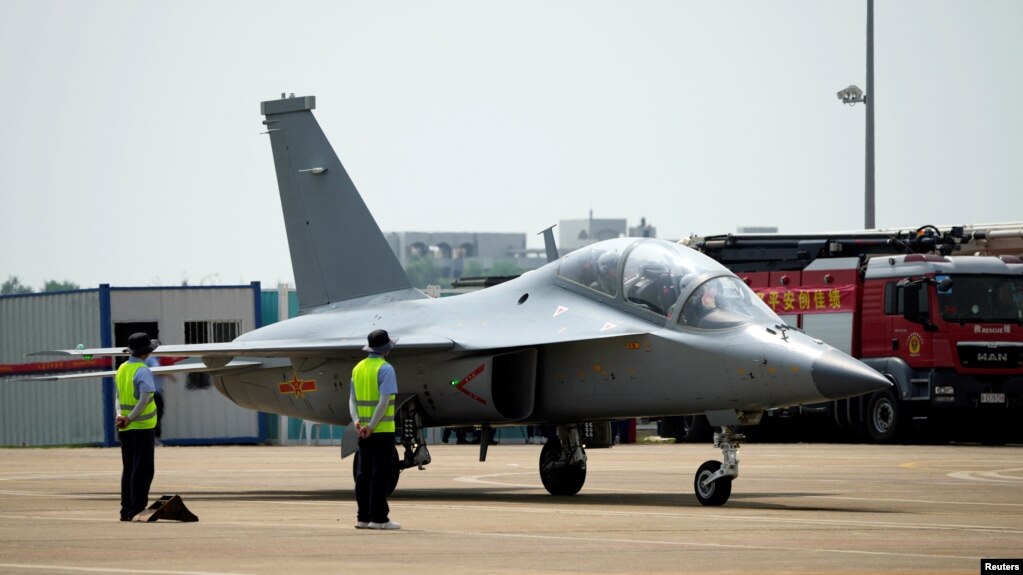
Pilots operate a JL-10 advance trainer jet of Chinese People’s Liberation Army (PLA) Air Force at the China International Aviation and Aerospace Exhibition, or Airshow China, in Zhuhai, Guangdong province, China September 28, 2021. (REUTERS/Aly Song)
Russia’s invasion of Ukraine is likely to threaten one of China’s most secretive, but important relationships in recent years. China has purchased technology for its growing military from Ukraine.
Ukraine and China’s relationship has come under increased pressure from the United States. Military experts and diplomats say the current war could end a trade agreement that has helped China modernize its military over the last 20 years.
Ukrainian anger over China’s growing ties with Russia and uncertainty over its post-war economy and government could threaten the relationship, experts say.
“It’s always been a good hunting ground for Chinese military technicians,” said Chinese military expert Vasily Kashin of HSE University in Moscow. “There is a lot there, and it has been in some cases easier to get than getting it from Russia.”
He added that the “relationship as it was will be completely destroyed” over China’s diplomatic support for Russia.
China purchased from Ukraine one of the Soviet Union’s last aircraft carriers and parts of a fighter jet. China has also bought airplane engines, destroyers and tanks from Ukraine, says the independent Stockholm International Peace Research Institute, or SIPRI.
Asia-based military experts say Ukraine has long been suspected of selling some command-and-control systems and other technology used in missiles. Ukrainian technicians have also worked privately inside China.
This work is expected to continue even if the official relationship worsens or becomes difficult, the experts said. “One traditional advantage for China in Ukraine is generally the security situation is more fluid than Russia, so it is possible to do things unofficially,” one expert told Reuters.
SIPRI estimates that China has spent at least between $70 million to $80 million a year on military technology from Ukraine.
For military technology, Russia remains China’s most important seller. But Ukraine has provided some items that Russia can be slow or unwilling to give.
SIPRI data shows a much larger Russia-China trade. Russia has provided China with more advanced engines for its airplanes, radars and surface-to-air, anti-ship and anti-tank missiles.
But a suspicious Russia has not always provided its latest technology to its large neighbor, experts say. For example, Chinese competitor Vietnam was able to get far more advanced submarines from Russia over the last decade.
The technology China’s military technicians and engineers have purchased has helped grow China’s own design and production abilities. That could mean China no longer needs Ukrainian technology.
“China was very dependent on Ukrainian technology in the 1990s and early 2000s, but that has diminished more and more,” said Siemon Wezeman. He is a researcher with SIPRI.
“There still may be some technology the Chinese are after, particularly aerospace and missile related,” Wezeman said.
If the United States is involved in post-war Ukraine, that could also make trading more difficult.
Already, pressure from the U.S. has had an impact. The Ukrainian government confirmed last year that it would halt the takeover of a local airplane engine maker by a Chinese company because of American concerns.
I’m Dan Novak.
Dan Novak adapted this story for Learning English based on reporting from The Associated Press and Reuters.
____________________________________________________________________
Words in This Story
advantage – adj. something that helps to make someone or something better or more likely to succeed than others
fluid – adj. used to describe something that can change easily or that changes often
radar— n. a device that sends out radio waves for finding out the position and speed of a moving object
advanced — adj. beyond the basic level
submarine — n. a ship that can operate underwater
dependent — adj. decided or controlled by something else
diminish — v. to become or to cause to become less in size, importance, etc.